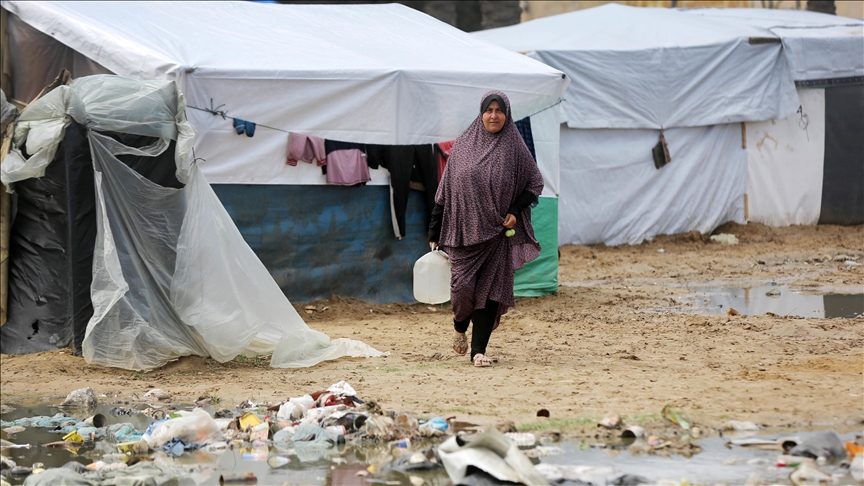Trash piles threat health of fleeing Palestinians in Rafah
Trash piles among tents and shelters foster infectious diseases due to foul odors and pest-friendly conditions in Rafah

- 'We can't sit in the tent due to smell of garbage and flies. Children can't sleep because of flies. Solution needs to be found to this garbage crisis,' says Palestinian refugee
- Another Palestinian refugee shows pile of garbage to Anadolu, saying: 'This is just small pile you see. If municipality hadn't come yesterday to collect garbage, it would have reached here'GAZA
Palestinians who have started living in tents in Rafah in southern Gaza after fleeing Israeli attacks are facing the risk of outbreaks due to uncollected garbage.
Palestinians in Rafah live amid trash piles as garbage trucks, rendered unusable in Israeli attacks, hinder regular waste collection due to fuel shortages.
Trash piles among the tents and shelters create an environment conducive to the spread of infectious diseases due to the foul odors they emit and conditions for the formation of pests.
Unable to stay in tents due to odor and flies
Ummu Mahmud el-Hindi, who migrated from the Sheikh Ridwan neighborhood in northern Gaza to Rafah, said the current conditions are not suitable for human life.
Hindi said that among family members, in addition to children, there are also sick, disabled, and elderly individuals.
She said: "We can't sit in the tent due to the smell of garbage and flies. Children can't sleep because of the flies. A solution needs to be found to this garbage crisis."
Pollution affects children's immune systems
Ahmed Davud, a Palestinian who migrated from Gaza City to Khan Yunis and then to Rafah, complained about the garbage and sewage water issue.
Davud noted that his children and wife were "greatly affected by this situation."
He said: "The immune levels of my three children have decreased. My wife also suffers because part of her liver and spleen have been removed."
Davud, showing the pile of garbage to Anadolu, said: "This is just a small pile you see. If the municipality hadn't come yesterday to collect the garbage, it would have reached here."
Tents fail to protect children from illness and cold
Another Palestinian, Abdulkadir Ahmed, who migrated from the Cibaliya Refugee Camp about five months ago, drew attention to the sewage waters flowing between the tents.
Ahmed stated that these waters cause children to become ill, saying: "We are enduring very difficult conditions here during the winter. There are many children in the tents, and these children are at risk of many diseases, including hepatitis, intestinal and respiratory diseases. The children here lack access to healthcare and are not safe in this unhygienic environment."
He stressed that the tents do not protect from illness and cold, and do not provide a humane living space.
Municipalities are 'inadequate in providing services'
Gaza Municipalities Union Coordinator Husni Muhenna told Anadolu emphasizing that municipalities in the central and southern parts of Gaza are unable to provide basic services due to the increasing number of displaced people.
Muhenna stated that services such as garbage collection, sewage disposal, and water pumping are greatly affected by population growth and fuel shortages.
Highlighting an increase in garbage piles in Rafah and Deir al-Balah, Muhenna noted that municipal teams are struggling to cope with these issues.
Israel has waged a deadly military offensive on the Gaza Strip since a cross-border attack early last October by the Palestinian group, Hamas, killed less than 1,200 people.
More than 33,000 Palestinians have since been killed and 75,750 injured amid mass destruction and shortages of necessities.
Israel has also imposed a crippling blockade on the Gaza Strip, leaving its population, particularly residents of northern Gaza, on the verge of starvation.
The Israeli war has pushed 85% of Gaza’s population into internal displacement amid acute shortages of food, clean water, and medicine, while 60% of the enclave's infrastructure has been damaged or destroyed, according to the UN.
Israel is accused of genocide at the International Court of Justice, which last week asked it to do more to prevent famine in Gaza.
Anadolu Agency website contains only a portion of the news stories offered to subscribers in the AA News Broadcasting System (HAS), and in summarized form. Please contact us for subscription options.







